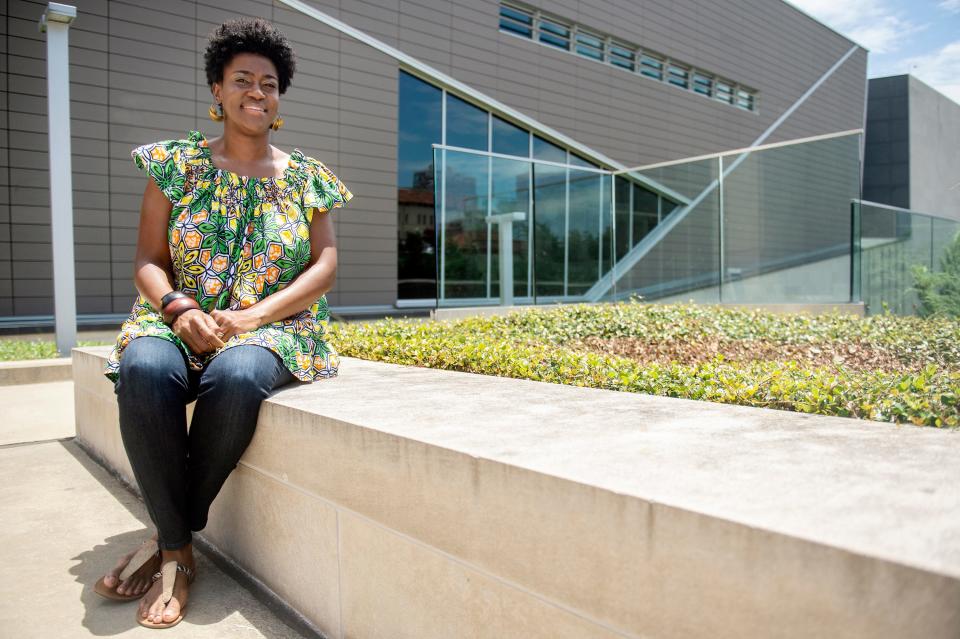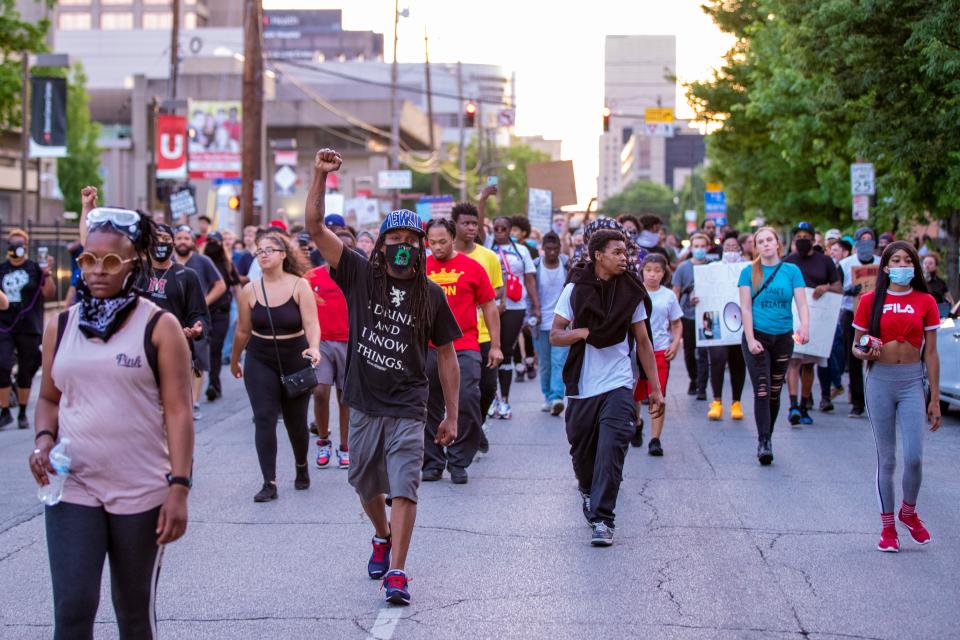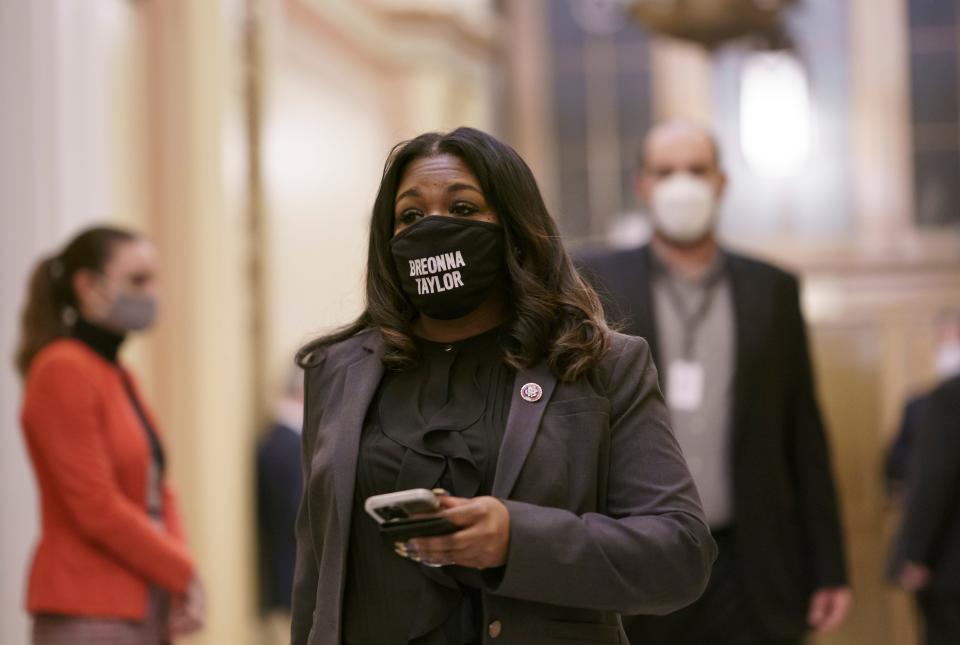60 years of activism: From the Freedom Rides to BLM, generations discuss work, parallels
JACKSON, Miss. — Fred Douglas Moore Clark Sr. remembers lying on the concrete floor of a Mississippi State Penitentiary cell in Parchman, sucking in fresh air from a crack below the cell door. It soothed his lungs, rattling with pneumonia.
No sheets. No blankets. No toilet. The cell bare but dense with Mississippi humidity.
He said his cellmate told him what people hadn’t dared say too loudly.
“We’re gonna die in here.”
The cellblock was full of Freedom Riders arrested May 24, 1961 at a Jackson, Mississippi, bus station. It was a stop through the South on organized bus trips to show interstate transit terminals remained segregated after the United States Supreme Court ruled the segregation unconstitutional in Boynton v. Virginia the previous year.
Bigger than music: How Harry Belafonte contributed to Freedom Rides, civil rights movement
Clark had worn his best suit that day. A thick wool number. He’d intended to purchase a bus ticket and make his way to New Orleans. Within minutes, police entered the station, handcuffed Clark and 26 others.
Only 18, Clark was arrested for inciting a riot and breaching the peace.

For weeks, he saw people dragged out of Parchman cells by their feet. The chorus of freedom songs sung by prisoners was the only sound that drowned out the fear racing through Clark’s mind during the 45 days he’d spend behind bars until they were ordered to stop.
Some 60 years later on a cloudless July afternoon, Zoe Bambara, 19, was held in a cell block with 20 others and a small window at Louisville Metro Department of Corrections.
She’d made her way to Louisville, Kentucky, where Breonna Taylor had been fatally shot by police four months earlier. But Louisville protests were unlike the peaceful daytime gathering she helped organize in her Atlanta hometown. At night, a crowd looted businesses, shattered windows and fired guns as the summer sun dipped below the horizon. Police officers responded with tear gas and rounds of rubber bullets.
Bambara didn't back down.
During a July 15, 2020, demonstration on Kentucky Atty. Gen. Daniel Cameron’s front lawn, Bambara’s hands were zip-tied behind her back as she was arrested alongside dozens of protesters.
Less than a day later, she was released.
Related story: Black activists travel the South to push for voting protections, honor Freedom Riders

Bambara and Clark, amid different movements, were young activists stepping into their own. Six decades separate their arrests, but some wonder if they're really so different.
Activism in America has never happened overnight. Social movements aren’t turned on by a light switch. They’re powered by decades of sacrifice and organized actions. Activists today walk in the footsteps of people at the forefront of the civil rights movement and the many unnamed who risked their lives for the generations before them to be treated equally.
Sixty years ago, Black Americans demanded change. They wanted to be treated equally while being educated, while walking through the world, while getting a drink of water.
Now, social justice activists work to end police brutality, gain legislative seats, increase access to good schools, challenge restrictive voting rights, reform prisons and seek equal rights for people of color, the LGBTQ community, immigrants and those living with disabilities.
The breadth of modern-day activism wouldn't be possible without the fortitude of civil rights activists generations ago. Some say the experiences aren’t comparable.
But the activists are.
Addressing the role racism plays: Hundreds of communities declared racism a public health crisis. What's happened since?
They are tired. Angry. Persistent. Natural-born leaders and organizers. They want equality. Change. Justice and accountability. And they’re willing to sacrifice their lives so others can walk free.
Asked to assess the difference between those who worked so hard 60 years ago and those who worked so hard last year, one older activist summed it nicely: Everything has changed but nothing has changed.
From the Freedom Rides to 2021
Bernard Lafayette, who turns 81 on July 29, tells his stories of activism calmly from his Tuskegee, Alabama, home. But his tone changes when he talks about the Greyhound bus idling into Montgomery, Alabama, on May 20, 1961.
The Freedom Riders walked down the steps into a violent crowd littered with Ku Klux Klan members. Lafayette's then-college roommate, John Lewis, was struck with a Coca-Cola crate. Lafayette, then 20, was kicked in the ribs. William Barbee was slammed onto the pavement, then a lead pipe was jammed into his ear.
Lafayette never threw a punch. It’s what he’d been trained to do. Respond with nonviolence.

Since then, progress was made, Lafayette knows this. America, by law, is desegregated. But he knows this, too: Equality remains elusive.
Summer 2020 activists, protesting back-to-back police killings of Black people, were still met with police brutality. Rubber bullets ricocheted off people’s limbs and faces. Police cruisers drove into throngs of protesters. Safety for young activists was no more guaranteed today than it was 60 years ago.
Young activists are impressing Lafayette. Particularly women — who were largely uncredited during the Civil Rights Movement — who have made their way to the forefront of today’s activism circles.
Women like Brea Baker.
Opinion: Trayvon Martin's mother: As BLM turns 8, I reflect on loss of my son, families of movement
Baker is 27 and living in Atlanta. She can’t put a finger on the day she was called to social justice. Everything blurs for her.
But the 2012 killing of Trayvon Martin was a clear call to action. Martin was fatally shot in Florida on Feb. 26, 2012 by a neighborhood watch coordinator, George Zimmerman.
Zimmerman would later be acquitted for the shooting, claiming self-defense and effectively employing the protections offered in Florida's stand-your-ground law.
“I was just an angry kid then,” Baker said.
She took her teenage fury and began to channel it. Her anger matured into organized activism.
“Young people have always been central to any social justice movement throughout history,” said Daphne Chamberlain, Tougaloo College assistant provost and professor of history. “These are young people who were socially conscious of what was going on and paying attention to what was going on.”
Baker became the youngest national organizer at the 2017 Women’s March in Washington, D.C., where the streets were flooded with hundreds of thousands enraged and emboldened after former President Donald Trump's election.
A year later, she contributed to the 2018 school walkouts to protest gun violence after a gunman opened fire at Marjory Stoneman Douglas High School in Parkland, Florida. He killed 17 people.
“We had people from all over the country, even in some international locations, walking out of their schools to protest gun violence,” Baker said. “People said, 'Oh my gosh, how did you get a million kids to do that?'”
Baker and other organizers looked back to the Children’s Crusade of 1963, which brought more than 1,000 Birmingham students out of their schools and into the streets in to protest segregation.
Sure, she used new technology and now ubiquitous social media to her advantage. Her voice rippled through social platforms faster than if she had relied on the U.S. postal service or the evening news hour. It’s not that different from 60 years ago. The Birmingham Children’s Crusade was organized by a local radio DJ, Chamberlain said. Today’s world, with messages spread in nanoseconds, is just more expedient.
A simple tweet can speak volumes to young people. It brought hundreds of thousands out in the summer of 2020 to protest police killings of Black people around the nation.
But activists and historians alike will say the work begins the day after any march, because the number of those who will go on to challenge legislation, make it to city meetings and call their representatives, is far smaller.
The parallels of activists 60 years ago are strong. The Freedom Riders and Black Lives Matter movement share a common denominator.
“When there’s no recognition of a person’s dignity or humanity, when there are basic human rights that are being denied, that’s what prompts people to action,” Chamberlain, said.
'Much different situations': Florida Gov. DeSantis' protest law was meant to prevent riots in the wake of BLM protests. Now it's in the way of SOS Cuba demonstrations.

Even before the Freedom Riders, young people saw themselves in the likes of Emmett Till before he was lynched by two white men in Money, Mississippi, in 1955. Now, young people look at the police killings of Ahmaud Arbery, Breonna Taylor, Atatiana Jefferson, Philando Castile, Tamir Rice and Michael Brown.
For many, the sacrifice to dedicate a life to activism is too much. It’s long hours. Little pay. A constant push and pull.
“It just comes with the territory,” Baker said.
A mother raising activists
A Northern Kentucky mother of two teenage girls heard George Floyd’s cries for his momma as police officer Derek Chauvin pinned his knee into Floyd’s neck.
“He called every mother out that day,” Chris Brown, 40, said.
Brown was sick of seeing Black people killed in the streets. She acted on instinct and a mother’s love. She whipped out a pen and paper and began to plan a march. It took Brown only four days to pull together a march in Elsmere, Kentucky, that took hundreds of people down one of the town's main roads, Dixie Highway.
Brown didn’t stop there.
“There’s a soul-cry that happens when you’re an activist, and it’s nothing that you just wake up one morning and say, 'Today, I’m going to be an activist,’” Brown said. “It’s a fighting instinct. You’re willing to fight for who needs your support, even if it’s to the deficit of yourself.”
Brown’s words carry weight and power in Elsmere that activists who came before her, Rosa Parks, Diane Nash and Ella Baker, never had. But when she traveled nearly two hours south to Louisville last summer, the tension there is how she imagined 1960s activism felt.
The sun beat down relentlessly on the marchers. Police officers in Louisville carried batons and tear gas; some were posted alongside armored military vehicles. It was nothing like law enforcement back home. She kept thinking to herself: “We’re not even armed.”

Around 60 people went to jail that day, Brown said, remembering them seated in an intersection near the famous racetrack Churchill Downs.
She knows it wasn’t the same violence the Freedom Riders met in 1961. Ku Klux Klan members weren’t beating activists. Her mode of transportation wasn’t manipulated or left to burn. She would travel safely back home that same day with her teenage daughters.
Still, the powerlessness was palpable.
David McAtee slaying: Police action marred by 'poor communication,' confusion and mistakes
The work is far from over. It won’t happen in Brown’s lifetime, she says. But Brown knows one thing when she looks into the eyes of her two daughters: Activists tend to raise activists.
Shifting the face of politics
It was the Rev. Darryl Gray who speculated about the six decades of activism since the Freedom Rides, saying: “Everything has changed, but nothing has changed.”
He would know. He’s spent the past half century as an activist.
He’d take to marches and boycotts. Become a politics reporter. Start up a Black newspaper. Work as Southern Christian Leadership Conference’s national director of communications. Take an executive position at the NAACP in Atlanta.
After 18-year-old Michael Brown was fatally shot in Ferguson, Missouri, in August 2014, unrest tore through the nation. Gray called it "the new Selma."
He didn’t think activists had done enough. But Gray knew someone who was putting in the work: Cori Bush. She’d worked as a frontline protester from the very beginning.

Bush came to Gray when she wanted to start a Southern Christian Leadership Conference chapter in St. Louis, Missouri. But it wasn’t long until she told him to put it on hold.
“I want to run for the Senate,” Bush told Gray, adding she wanted to challenge Jason Kander in the 2016 primary election.
Bush had no political experience back then. She had no deep pockets to run a campaign. She was a registered nurse. A mother of two. A Black woman who was going to finish what she started.
But Gray didn’t miss a beat. He’d serve as her campaign manager.
Bush lost to Kander in 2016.
Four years later, she would be voted in as the representative of Missouri's 1st Congressional District.
Follow Sarah Haselhorst on Twitter: @HaselhorstSarah.
This article originally appeared on Mississippi Clarion Ledger: BLM activists and Freedom Riders discuss generations of activism

